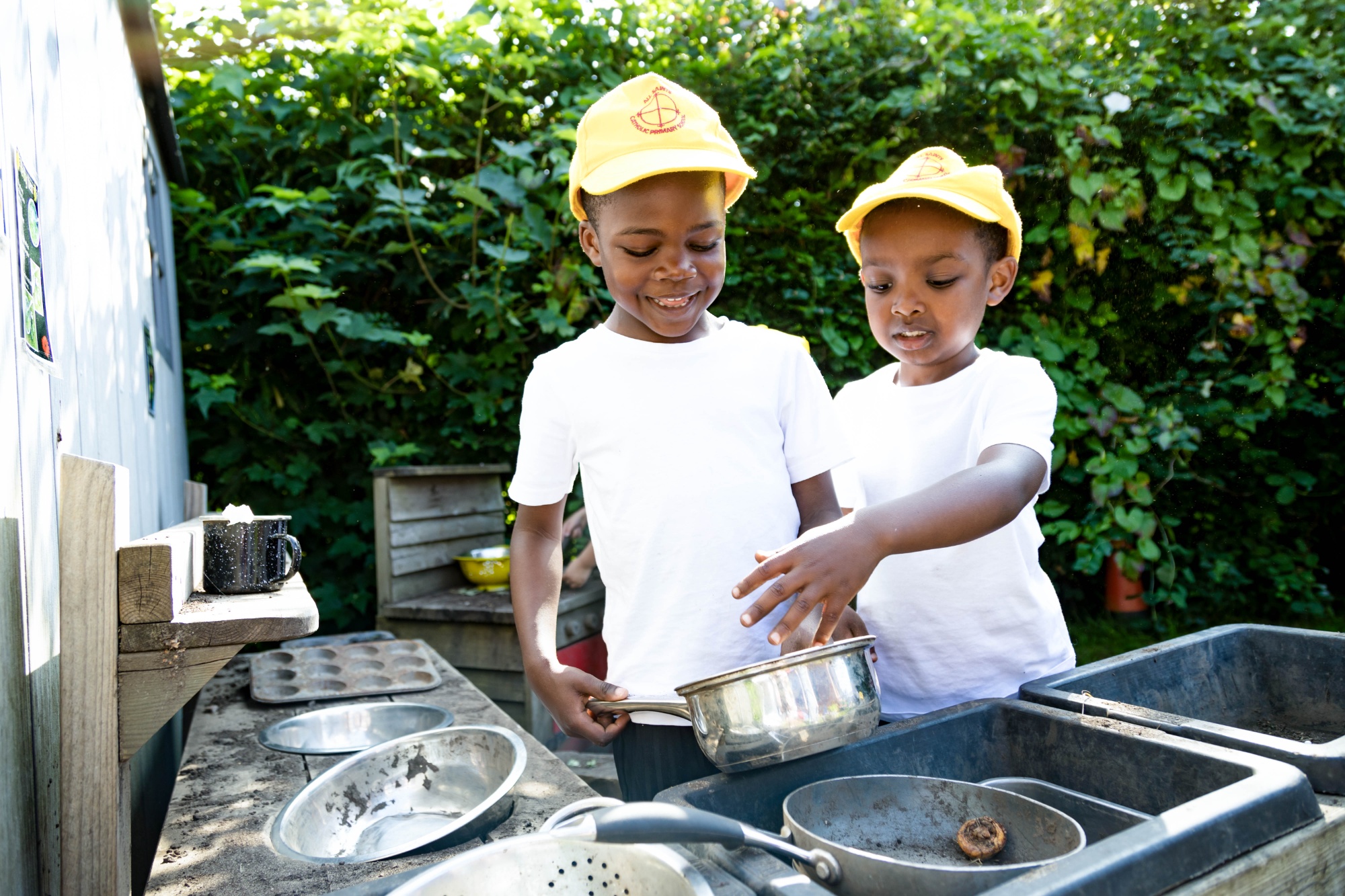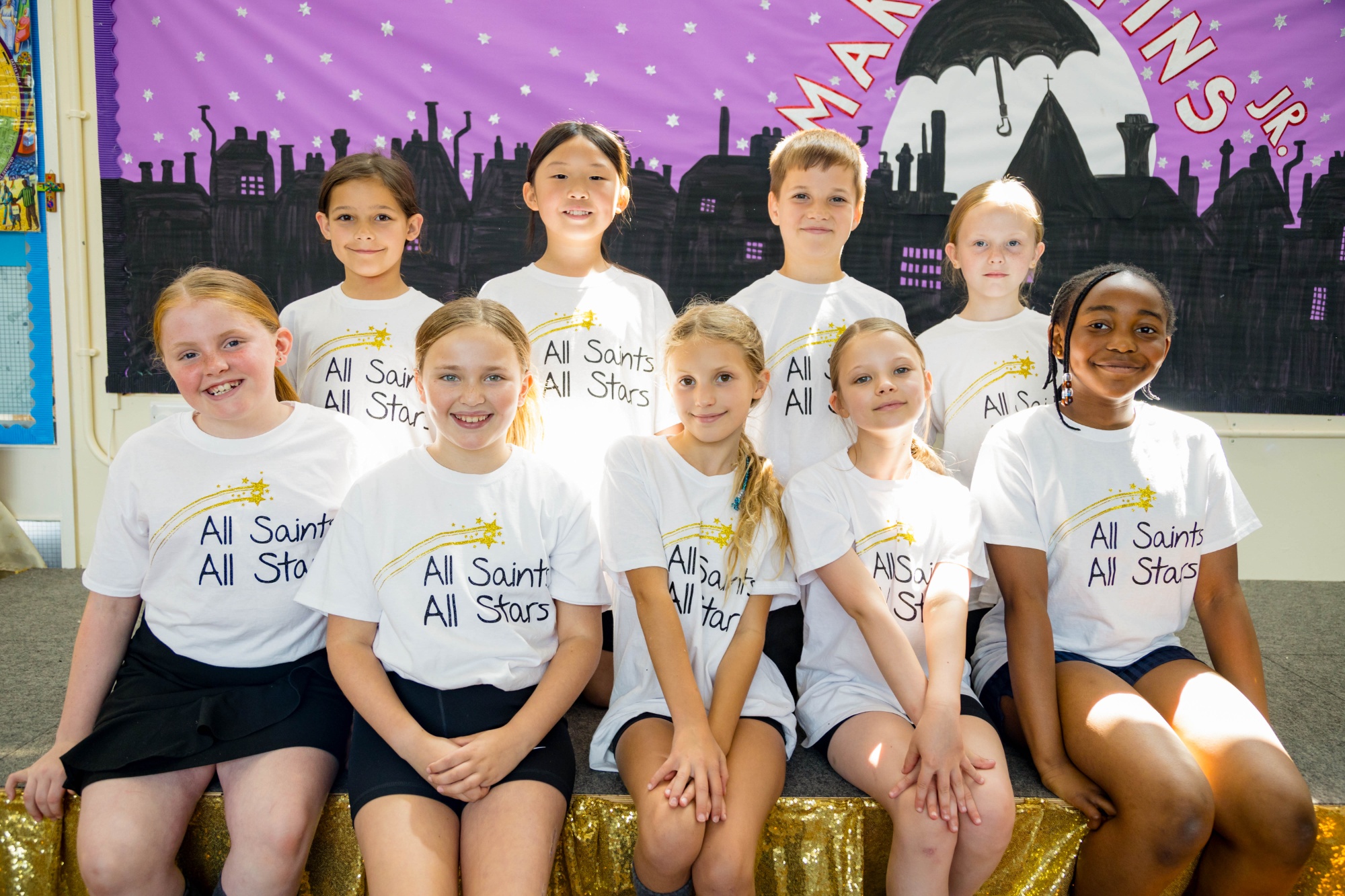Music
Living our Faith, Learning in Love
Overview
At All Saints' Catholic Primary School, we believe that music is a vital part of a broad and balanced curriculum. Music inspires creativity, self-expression, and emotional development. It helps children develop confidence, resilience, and a sense of community. We aim to provide an inclusive and engaging music education that equips pupils with lifelong musical appreciation and enjoyment.
We follow the Kapow Primary Music Scheme, chosen for its comprehensive coverage of the National Curriculum, clear progression of skills, accessibility for all learners, and support for teacher subject knowledge.
Curriculum Intent
Our music curriculum aims to:
- Develop pupils’ musical knowledge, skills, and understanding progressively from EYFS to Year 6.
- Inspire children to engage with music through listening, composing, performing, and appraising.
- Introduce pupils to a wide range of musical traditions, genres, styles, and cultures.
- Provide opportunities for all pupils, including those with SEND and disadvantaged backgrounds, to succeed and enjoy musical experiences.
Through a carefully structured and inclusive curriculum, we aim to foster curiosity, creativity, and confidence in music-making. We value music as a unique form of expression that enhances wellbeing and connects children with diverse cultures, histories, and communities.
Long Term Plan
The music curriculum is organised through a clearly sequenced long-term plan, ensuring coverage of the key areas:
- Singing and vocal development
- Playing tuned and untuned instruments
- Listening and appraising
- Composing and improvising
- Understanding and using musical notation
The plan outlines core knowledge and skills to be taught each term across all year groups. Repertoire and activities are mapped to include a balance of historical, contemporary, classical, popular, and world music traditions.
Progression
Progression is built into all aspects of the curriculum:
- Skills: Pupils develop greater control, coordination, and accuracy in performance over time.
- Knowledge: Understanding of musical concepts (such as pulse, pitch, rhythm, dynamics, structure) deepens through repeated encounters in different contexts.
- Vocabulary: Musical terminology is introduced incrementally and used accurately by pupils.
- Notation: Children move from using graphic symbols in EYFS to staff notation in KS2.
Assessment milestones and 'sticky knowledge' are identified in each phase to support ongoing formative assessment and ensure cumulative learning.
Early Years
In EYFS, music is embedded within the Expressive Arts and Design area of learning. Children:
- Explore sound using their voices and a range of instruments.
- Sing familiar and new songs with increasing control.
- Move rhythmically and expressively in response to music.
- Begin to listen attentively and talk about sounds they hear.
Music is integrated into daily routines, continuous provision, and topic themes.
Key Stage 1 (KS1)
In Years 1 and 2, pupils:
- Use their voices expressively through songs, chants, and rhymes.
- Play classroom percussion instruments with increasing confidence.
- Experiment with creating sounds and simple patterns.
- Listen to a range of music and describe key features.
- Begin to follow simple notation and graphic scores.
Activities are practical, inclusive, and engaging, often linked to class topics.
Key Stage 2 (KS2)
In Years 3 to 6, pupils:
- Develop singing skills, including part singing and harmony.
- Play instruments with greater accuracy and fluency (e.g. recorder, tuned percussion).
- Compose pieces using a range of stimuli and notations.
- Listen to and appraise music from various genres and cultures, identifying musical elements.
- Use standard notation to read and record rhythms and melodies.
Curriculum Implementation
Music is taught weekly across all year groups through a carefully sequenced curriculum.
- Curriculum Design: Based on the Kapow Primary Music Scheme, offering a spiral curriculum model where knowledge and skills are revisited and deepened.
- Practical Approach: Lessons are hands-on, involving singing, playing instruments, improvising, composing, and listening.
- Teacher Support: Non-specialist teachers are supported by Kapow’s video tutorials, modelling, and CPD materials.
- Performance Opportunities: Regular performances are embedded into school life, including assemblies, concerts, and productions.
- Instrumental Learning: Pupils have access to tuned and untuned percussion and, where possible, specialist tuition.
- Inclusion: Lessons are designed to be adaptable so that every pupil, including those with SEND, can access and enjoy music education.
Display and Working Walls
Music working walls and displays are used throughout the school to reinforce learning and celebrate achievement. These spaces present current key vocabulary, musical notation, and visual aids related to ongoing topics. They may include images of instruments, prompts for musical enquiry, and examples of pupils’ work. Displays are regularly updated to reflect the musical journey of each class and to inspire engagement.
Vocabulary
Developing musical vocabulary is an essential part of our curriculum. Children are introduced to subject-specific language progressively, ensuring they can describe, discuss, and reflect on music using accurate terminology. Key words such as tempo, pitch, rhythm, dynamics, structure, and notation are explicitly taught and displayed in classrooms. These terms are reinforced through oral discussion, writing activities, and practical application during lessons. By embedding vocabulary in meaningful contexts, pupils build confidence in using the language of music effectively.
Enquiry
Our music lessons are often framed around enquiry-based questions that promote curiosity and deeper thinking. These questions might include, “How can we use instruments to tell a story?”, “What makes a good group performance?”, or “How does music express different emotions?” Such enquiries encourage pupils to explore musical concepts critically and creatively. Through this approach, children learn to listen attentively, make connections between musical elements, and justify their opinions using appropriate vocabulary.
Quiz and Knowledge Recall
Retrieval practice is embedded in our music teaching to support memory and reinforce learning. Pupils regularly take part in informal quizzes, listening challenges, and rhythm games designed to revisit key concepts and vocabulary. Teachers incorporate quick recall activities at the start or end of lessons, helping pupils consolidate prior knowledge before building upon it. This approach ensures that musical understanding is retained over time and that pupils are able to apply what they have learned in new contexts.
Mind Mapping
Mind maps are used across key stages to help pupils organise their thinking and reflect on their learning. These visual tools support children in planning compositions, analysing pieces of music, or summarising a unit of work. Pupils may work individually or collaboratively to create mind maps that link concepts such as rhythm, instrumentation, and musical structure.
Musical Educational Visits
We value real-life experiences as an essential part of musical learning. Pupils have opportunities to attend live music events, such as orchestral concerts, community performances, or school-led visits. We also invite musicians and music specialists into school to lead workshops, broadening pupils’ exposure to different instruments, styles, and cultural traditions. These visits are planned to enhance curriculum coverage and provide memorable experiences that inspire lifelong appreciation for music.
Class Assemblies
Class assemblies provide a valuable opportunity for pupils to share their musical learning with the wider school community. Each class participates in at least one music-integrated assembly per year, where children may perform songs, demonstrate instrumental work, or present compositions linked to cross-curricular themes. These assemblies support pupils in developing confidence as performers, while also strengthening links between music and other areas of the curriculum, such as RE, history, or PSHE.
On every appropriate occasion teachers will use first-hand experience, visits, visitors and the local and wider community to engage children’s musical interest and imagination.
Curriculum Impact
We measure the impact of our music curriculum through:
- Pupil outcomes: Children demonstrate progression in performing, composing, and appraising skills.
- Pupil voice: Pupils can talk confidently about their music learning, showing enthusiasm and understanding.
- Work sampling: Recordings of performances and samples of creative work show progression over time.
- Monitoring: The Music Subject Leader carries out lesson observations, planning scrutiny, and data analysis to ensure quality and consistency.
By the end of Key Stage 2, pupils will have developed a solid foundation in musical skills and knowledge, preparing them for future musical engagement at secondary school and beyond.
Assessment
Assessment in music is continuous and informs teaching and learning:
- Formative Assessment: Observations, questioning, peer and self-assessments are used within lessons to gauge understanding and progress.
- Summative Assessment: Kapow's end-of-unit assessments help track individual and group progress against expected outcomes.
- Evidence Collection: Recordings of performances, compositions, and pupil reflections serve as evidence of achievement.
- Use of Assessment:
- Inform planning and differentiation.
- Identify pupils needing further challenge or support.
- Support reporting to parents and leadership.
- Subject Monitoring: Assessment information is reviewed termly by the Music Subject Leader to ensure consistency and impact across the school.

Early Years
Music is integral to learning in the Early Years Foundation Stage (EYFS):
- Embedded within Expressive Arts and Design.
- Children experience music through singing, movement, musical storytelling, and rhythm-based activities.
- Focus on developing listening and attention, creativity, motor skills, and expressive communication.
- Simple musical vocabulary and concepts (e.g., loud/soft, fast/slow) are introduced.
- Musical activities are linked to thematic learning and daily routines.
Musical learning in EYFS lays a strong foundation for the more structured curriculum in Key Stage 1.
Special Educational Needs Disability (SEND)
Music education at All Saints' Catholic Primary School is fully inclusive:
-
Adapted Lessons: Tasks are scaffolded to allow access for all abilities, including visual supports, simplified notation, and alternative ways to participate (e.g, body percussion, vocal sounds).
-
Differentiated Resources: Kapow’s flexible lesson materials allow adaptation for varied learning needs.
-
Support Staff: Teaching assistants help facilitate musical engagement for pupils with additional needs.
-
Celebrating Achievement: Every pupil’s musical progress, no matter how small, is recognised and celebrated.
-
Accessibility: Ensuring all children have access to musical instruments and opportunities to perform.
We are committed to enabling every pupil to express themselves musically and achieve personal success.
Special Educational Needs (SEND)
Music education at All Saints' Catholic Primary School is fully inclusive:
- Adapted Lessons: Tasks are scaffolded to allow access for all abilities, including visual supports, simplified notation, and alternative ways to participate (e.g, body percussion, vocal sounds).
- Differentiated Resources: Kapow’s flexible lesson materials allow adaptation for varied learning needs.
- Support Staff: Teaching assistants help facilitate musical engagement for pupils with additional needs.
- Celebrating Achievement: Every pupil’s musical progress, no matter how small, is recognised and celebrated.
- Accessibility: Ensuring all children have access to musical instruments and opportunities to perform.
We are committed to enabling every pupil to express themselves musically and achieve personal success.

Composer of the Month
Each month we have a featured composer of classical or art music. Children throughout the school learn about the composers time period and concepts relating to his or her life and music.
Where is God in Our Music?
At All Saints’, we believe that music is a gift from God — a unique and powerful way through which we can experience beauty, joy, and connection. Music enables pupils to reflect deeply, express their emotions, and engage spiritually, offering moments of awe and wonder.
Through our music curriculum, we aim to nurture each child’s God-given creativity and encourage them to use their musical gifts in ways that uplift and inspire others. Whether composing, performing, or listening, children are invited to consider how music can be a form of praise, a channel for compassion, and a reflection of God’s presence in the world.
Our Christian vision is embedded in our approach to teaching music. The values we uphold as a school — rooted in faith — shape the way children work together, appreciate different musical traditions, and develop confidence and resilience through performance. Music also plays a central role in prayer and liturgy, helping children express their spirituality and engage meaningfully in moments of reflection, celebration, and praise.
In all these ways, music at All Saints’ becomes more than a subject: it becomes a way for pupils to grow spiritually, build community, and recognise the presence of God in their learning and in each other.




